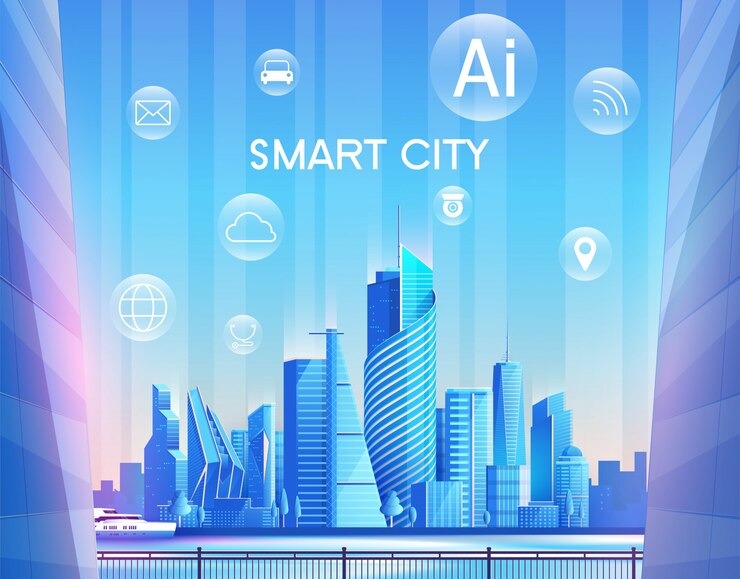
Challenges of Implementing AI in Smart Cities: What to Expect
Smart cities are on the rise, and one of the key drivers of this trend is the emergence of artificial intelligence (AI) technologies. By using AI to optimize infrastructure, transportation, and public services, smart cities can improve the quality of life for their citizens and create more sustainable and efficient communities. However, the use of AI in smart cities also poses significant challenges, including privacy concerns, data security, and equitable access to these technologies.
One of the biggest benefits of AI-powered smart cities is their ability to optimize public services and infrastructure. By using sensors and other IoT devices, cities can collect data on traffic patterns, air quality, and energy consumption. This data can then be analyzed using AI algorithms to optimize the delivery of public services and improve the efficiency of infrastructure.
For example, Barcelona has implemented a smart lighting system that uses sensors and AI to adjust lighting levels based on the presence of pedestrians and vehicles, which has reduced energy consumption by 30%.
Smart cities can also use AI to optimize transportation and reduce congestion. For example, Singapore has implemented a smart traffic management system that uses sensors and AI to monitor traffic flow and adjust traffic lights in real-time, which has reduced traffic congestion by 15%. This can help to reduce emissions and improve air quality, which can have significant public health benefits.
However, the use of AI in smart cities also poses significant challenges. One of the biggest concerns is privacy. The use of sensors and other IoT devices to collect data on citizens raises questions about the use and protection of this data. Governments and companies must be transparent about how they collect, store, and use this data, and must implement strong data security measures to protect citizens’ privacy.
Another challenge is the issue of equitable access to AI-powered smart cities. As these technologies become more prevalent, it will be important to ensure that all citizens have access to them, regardless of their income or social status. This will require government policies and initiatives that promote the equitable distribution of these technologies.
Another concern is the potential for AI to perpetuate biases and discrimination. If the data used to train AI algorithms is biased, this can lead to biased outcomes that disadvantage certain groups of people.
For example, if a smart transportation system is trained on data that only reflects the travel patterns of wealthy individuals, it may not accurately reflect the transportation needs of lower-income citizens.
To address these challenges, there are several steps that can be taken. First, there needs to be greater transparency and accountability in the use of AI in smart cities. Governments and companies must be open about how they collect, store, and use data, and must implement strong data security measures to protect citizens’ privacy.
Second, there needs to be a focus on equity and access in the development of smart city technologies. Governments and companies must work to ensure that all citizens have access to these technologies, regardless of their income or social status. This may involve government initiatives to provide funding and support for the development of smart city technologies in underserved communities.
Finally, there needs to be a focus on diversity and inclusion in the development of AI-powered smart cities. Governments and companies must ensure that the data used to train AI algorithms is diverse and representative of all citizens, and must work to eliminate biases and discrimination in these technologies.
In conclusion, the emergence of AI-powered smart cities presents significant benefits and challenges. By using AI to optimize public services, transportation, and infrastructure, smart cities can improve the quality of life for their citizens and create more sustainable and efficient communities. However, the use of AI in smart cities also poses significant challenges, including privacy concerns, data security, and equitable access to these technologies. By addressing these challenges, we can ensure that AI-powered smart cities are safe, equitable, and beneficial to all citizens.
Liked this blog? Sign up for our exclusive AI monthly newsletter.
Previous articles

AI 2024: Predictions and Advances in Artificial Intelligence
There’s no doubt 2023 was a landmark year for AI technologies. From healthcare to customer service and beyond, AI transformed the way the average person communicates, works, and solves complex problems. In this article, we’ll delve into the advances and breakthroughs achieved in AI development, as well as the opportunities and challenges that lie ahead […]

AI Call Centers: Turning Customer Support into Customer Experience
When a customer contacts an AI-enabled call center, two things can happen: The customer leaves satisfied with the interaction Their issue is not resolved and they leave with a negative association of your brand Keeping customers satisfied relies on the appropriate use of AI in call centers. This often means centering AI automation as a […]